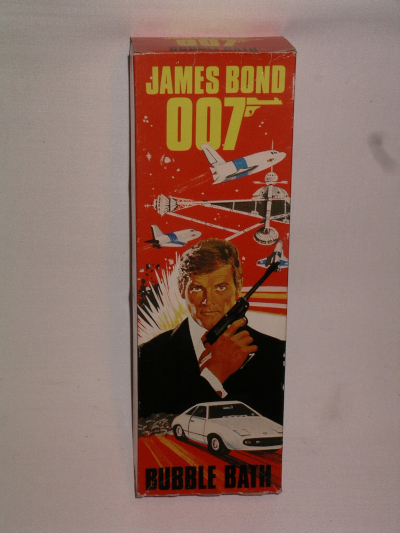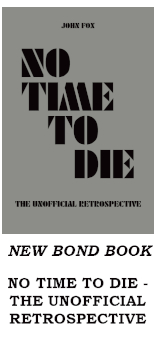|
Moonraker - The Reception

Moonraker
is often tagged as EON's attempt to latch onto the Star Wars craze but
you could argue that the movie is often more influenced by Kubrick's
2001 than Star Wars. Nonetheless, the incredible success of Star Wars
in 1977 was clearly the main catalyst for Cubby deciding to send Bond
into space. As usual, the film made by EON, save for a title and
character names, would bear little resemblence to Fleming's novel.
Lewis Gilbert was signed to direct again and Christopher Wood wrote the
screenplay. The obvious tactic of Cubby Broccoli was simply to keep The
Spy Who Loved Me team in place. If it isn't broke why fix it? Tom
Mankiewicz previously wrote an unused script treatment for Moonraker
for EON and Mankiewicz's treatment included elements which were used in
later Bond films. These most saliently included an Acrostar jet chase
(which was used in Octopussy) and an action setpiece in Paris (A View
To A Kill).
Moonraker ended up costing well over thirty
million dollars to make. This dwarfed even the budget for The Spy Who
Loved Me. The eighties Bond films later had increasingly static budgets
because they were still paying off the interest on Moonraker going over
budget. Moonraker was so expensive that EON and MGM were still having
to instigate an austerity drive to pay for it ten years later.
Moonraker had a lavish marketing campaign which included many space
themed toys, an annual, and even a 007 bubble bath. Who wouldn't want
some James Bond bubble bath? Roger Moore also fronted a television
special too in order to promote the film. There was a lot of
anticipation and hype for the film. Bond hadn't been this big a deal
since Sean Connery was around. Moonraker premiered on 26 June 1979 at
the Odeon Leicester Square in London. The Duke of Edinburgh, Prince
Philip, was in attendence and celebrities included Britt Ekland, Joan
Collins, Dodi Fayed, Dino De Laurentis, and Richard Johnson (the actor
who famously turned down a contract to play James Bond in Dr No).
A
bearded Roger Moore was also there along with many members of the cast
and crew. Richard Kiel, an unmistakable figure for obvious reasons, was
a big attraction at the premiere and seemed to be enjoying himself. The
swanky afterparty was held at the London Playboy Club. In the preamble
to the release of Moonraker, Roger Moore said "Cubby Broccoli hasn't
asked me to do another, but then he never does until he sees how much
money he makes from the last one I've done." Roger had negotiated a
share of the gross for Moonraker. This turned out to be a shrewd deal
because Moonraker set box-office records for Bond which stood until the
Pierce Brosnan era. Adjusted for inflation, Moonraker was a blockbuster
for its time.
The New York Times gave Moonraker a glowing
review in 1979 when the film was released. 'At a time when everything
is being either inflated or devalued it's comforting to know that at
least one commodity maintains its hard currency. That's James Bond,
who, by all rights, should be an antique, as emblematic of the 60's as
the Beatles and flowerpower, but who goes blithely on as if time has
had a stop. Moonraker, which opens today at the Rivoli and other
theaters, is the 11th in the remarkable series that began in 1963 with
Dr. No and it's one of the most bouyant Bond films of all. It looks as
if it cost an unconscionable amount of money to make, though it has
nothing on its mind except dizzying entertainment, which is not
something to dismiss quickly in such a dreary, disappointing movie
season. Almost everyone connected with the movie is in top form, even
Mr. Moore who has a tendency to facetiousness when left to his own
devices. Here he's as ageless, resourceful and graceful as the
character he inhabits.'
The Globe and Mail was also impressed,
writing - 'In the first few minutes – before the credits – it offers
more thrills than most escapist movies provide in two hours. The
excitement has gone all the way up to giddy and never comes down.' Time
magaine was also kind to the film. 'If Moonraker is not quite as
satisfying as Spy, the best of the post-Sean Connery Bonds, the
difference is in the casting. Lonsdale is a bit too tame; he seems to
be doing a John Ehrlichman imitation. Chiles is all too sexless. The
title song, the important kickoff for Bond movies, is no match for
Nobody Does It Better, the Carly Simon dazzler of Spy. Still, one does
not tend to notice these failings as Moonraker unfolds. Broccoli just
keeps piling on the goodies: lush Ken Adam sets, gadgetry and gams
galore, super stunts and effects. It may be another two-year wait for
the next Bond film, so you may as well just stuff yourself silly now.'
Variety
was also reasonably kind to the film. 'Christopher Wood's script takes
the characters exactly where they always go in a James Bond pic and the
only question is whether the stunts and gadgets will live up to
expectations. They do. The main problem this time is the outer-space
setting which somehow dilutes the mammoth monstrosity that 007 must
save the world from. One more big mothership hovering over earth
becomes just another model intercut with elaborate interiors. The
visual effects, stuntwork and other technical contributions all work
together expertly to make the most preposterous notions believable. And
Roger Moore, though still compared to Sean Connery, clearly has adapted
the James Bond character to himself and serves well as the
wise-cracking, incredibly daring and irresistible hero.'
TIME
was also rather kind to the film and wrote - 'Wood pulls off some witty
flourishes. There are funny references to other blockbuster movies
(Close Encounters, Superman, Sergio Leone westerns), as well as amusing
bursts of comic-book dialogue. Rather than stage variations on Jaws'
old fiendish gags, Wood has given the character some surprising twists,
including a love interest. As always, there is no explicit gore or sex
to jolt the audience back to reality. If Moonraker is not quite as
satisfying as Spy, the best of the post-Sean Connery Bonds, the
difference is in the casting. Lonsdale is a bit too tame; he seems to
be doing a John Ehrlichman imitation. Chiles is all too sexless. The
title song, the important kickoff for Bond movies, is no match for
Nobody Does It Better, the Carly Simon dazzler of Spy. Still, one does
not tend to notice these failings as Moonraker unfolds. Broccoli just
keeps piling on the goodies: lush Ken Adam sets, gadgetry and gams
galore, super stunts and effects. It may be another two-year wait for
the next Bond film, so you may as well just stuff yourself silly now.'

Roger
Ebert was a shade grumpy though about Moonraker and didn't seem very
impressed. He also, tediously, went out of his way to compare Roger
Moore unfavourably to Sean Connery yet again. Ebert's main complaint
was that Moonraker was too fantastical and gadget festooned. 'The stars
of this movie are Ken Adam, the art director, and Derek Meddings, in
charge of special effects. In addition to the gigantic space station,
they provide lots of little touches, like 007's gondola in Venice,
which turns into a speedboat and then miraculously grows wheels.
Moonraker is a movie by gadgeteers, for gadgeteers, about gadgeteers.
Our age may be losing its faith in technology, but James Bond sure
hasn't.'
There were certainly some negative reviews when it came
to Moonraker. Many felt that the balance of jokes, plot, and action in
Moonraker had slid too far towards humour - to the point where the film
was a parody of Bond. Richard Maibaum was among those who held this
view. Maibaum later said that the Bond series could do without what he
called 'that space station crap'. He felt Moonraker was too silly and
thought Roger Moore had a tendency to spoof the part. This felt a
little unfair because Roger did what he was given to play. If he was
given a tense or 'straight' scene, like the centrifuge sequence, Roger
was always very good. There was definitely though a 'backlash' against
the comic book sci-fi excesses and comedic nature of Moonraker in the
end and this persuaded Cubby Broccoli that a course correction might be
needed for the next picture.
One other person who also
criticised the film was none other than Sean Connery. "I went in London
to see Moonraker with Roger and I think it's departed so much from any
sort of credence from the reality that we had [in my six films]," said
Connery. "Such a dependence on the effects and there's no substance." I
can't say that I agree with Sean that there was 'reality' in his Bond
films. I love the Connery Bond films but you'd hardly call films like
You Only Live Twice, Goldfinger, and Diamonds Are Forever realistic!
There has never been a realistic Bond film. Even the famously 'gritty'
Daniel Craig films are full of ridiculous implausible scenes.
When
Moonraker was released in 1979, Gene Siskel in the Chicago Tribune took
issue with the movie's gratuitous and gruesome product placement. 'In
the beginning of the Bond series, before they were thought of as a
series, each film was a good action picture with a colourful,
entertaining hero. Today, they come off as conglomerate business
enterprises rather than movies. How else does one explain the intrusive
commercial plugs in Moonraker for Christian Dior perfume, British
Airways, Bollinger champagne, Glaston boats, and Seiko watches? Truly,
money derived from these plugs can't be worth the loss of story
continuity when the products are flashed in front of the camera.
Someone is being awfully cheap about the plugs, which borders on
incredibility because the James Bond series is one of the surest
moneymakers in the film business. Maybe the producers of Moonraker are
blind to story construction?'
Siskel was right about Bond being
a sure moneymaker because Moonraker grossed $210.3 million - which was
even more impressive than The Spy Who Loved Me. The film was a global
hit, breaking records in many nations. It had the widest ever American
release for a United Artists film and drew record attendences in
France. People in France were especially interested in Moonraker
because it had obviously been an Anglo-French production. While not
everyone was happy about the direction in which the franchise was
heading there was no doubt that it was, from a commercial standpoint, a
popular and shrewd approach in the late 1970s. The problem was though
that after Moonraker there was nowhere left to go with this Lewis
Gilbert style fantastical approach to 007. EON would have to think very
carefully about the tone and direction of the next film. They would
also have to decide if they were going to carry on with Roger Moore.
* The article above is an extract from the book Roger Moore's James Bond - The Retrospective
© 2024
Alternative 007
|



|






